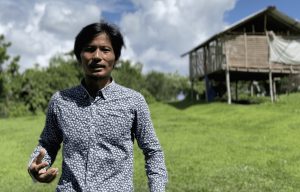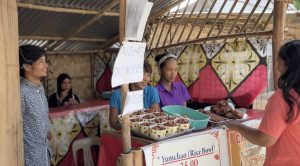Metro Manila offers a multitude of work opportunities being the center of commerce and a home for multinational companies which often offer high-paying jobs. But considering the high cost of living in the Metro, moving there does not guarantee success.
In 2020, the COVID-19 pandemic drastically affected all economic activities, especially Metro Manila. A lot of companies and businesses shut down because they were unable to cope with the pandemic. The paradigm of doing business also changed, affecting the livelihood of many families, causing some of them to decide to move back to their respective provinces. The busiest business district and home for multinational companies in the country suddenly became a ghost town. “Sinubukan namin mag-asawang magtayo ng maliit na negosyo noong kasagsagan ng pandemic. Ngunit sa hindi inaasahan, hindi po ito nag-succeed at dito namin naramdamang hindi na namin kayang mag-survive doon kaya nagpasya na kaming umuwi sa probinsya ng Pangasinan (My wife and I tried to put up a small business during the pandemic. Unfortunately, it did not succeed and we felt that we cannot survive living in Metro Manila so we decided to go home to the province of Pangasinan),” described Isagani Camba, a former sales manager in Alabang, Muntinlupa who had been living in the metro since 2009.

In April 2022, Isagani and his family decided to return to their town in Pangasinan. Later in August 2022, his family received assistance from the DSWD Field Office 1 through the Balik Probinsya, Bagong Pag-asa Program (BP2P). “Malaking pasasalamat namin dahil naalalayan kami ng DSWD Field Office 1 sa pamamagitan ng Balik Probinsya, Bagong Pag-asa Program. Dahil sa tulong ng programang ito, hindi kami nahirapan masyado at nakapagtayo ulit kami ng negosyo (We are very grateful to DSWD Field Office 1’s assistance through BP2P. Because of this program, we did not suffer much and was able to start a business again),” Isagani thankfully said.
The BP2 Program provided a Transitory Family Support Package for the transitional phase of the family while establishing a new life in the province. The family also received a seed capital fund or Livelihood Settlement Grant (LSG) facilitated by the Sustainable Livelihood Program and funded by the BP2 Program to help them start a small business. From this, Isagani began buying and selling goats and RTW clothes. Today, he has managed to raise almost 30 heads of goat and has opened a small eatery as an expansion of their small business. From the expanding business of Isagani, he is now able to employ a family as goat herders and two others as helpers in their eatery business. Moreover, he was able to save up from his profit and acquired a well-conditioned motorcycle that now serves as a better and safer transport for his family and business. Isagani and his wife also dream of having their own house, to give their children quality education, and expand their small eatery to a classic “kambingan” restaurant to help more people through employment.

“Patuloy pa naming sinisikap na mas mapalago pa ito at umaasa po kaming magtutuloy-tuloy ito hanggang sa makamit namin ang aming mga plano at pangarap para sa aming pamilya (We will continue to strive to be successful and hope to continuously operate until we reach our plans and dreams for our family),” Isagani claimed. Being decisive is one of the values that got him this far. He is optimistic about all their plans. Returning to Manila is no longer an option for he can now provide for his family while enjoying the comfort of living in the province.
“Pahalagahan natin ‘yung binigay na seed capital ng DSWD at humingi ng gabay mula sa Panginoon at sikaping mapalago ang ating negosyo at hindi mauwi sa wala (Let us value the seed capital from DSWD and ask guidance from God and give our best to flourish our business and not end up with nothing),” said Isagani.
The Balik Probinsya, Bagong Pag-asa Program together with the Sustainable Livelihood Program seeks to boost countryside development while fostering a better future for the urban poor Filipinos by encouraging them to return to their respective hometowns.(by: Jenny B. Dumaguin, Project Development Officer II, Kapit-Bisig Laban sa Kahirapan-Comprehensive and Integrated Delivery of Social Services, Balik Probinsya Bagong Pag-asa Program, documentation by: John Chris B. Zureta, Social Marketing Officer, Sustainable Livelihood Program)

